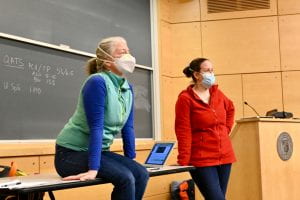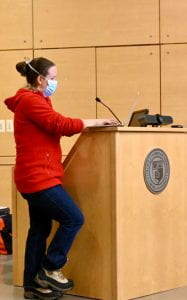What is Cornell Shelter Med up to now?
The faculty at Maddie’s® Shelter Medicine Program (MSMP) at Cornell teach several courses during the spring semester with central themes of animal welfare and population medicine.
Our program has three full-time faculty: Dr. Elizabeth Berliner, Swanson Endowed Director of Maddie’s® Shelter Medicine Program, Associate Clinical Professor of Shelter Medicine; Dr. Lena DeTar, Assistant Clinical Professor of Shelter Medicine; and Dr. Erin Henry, Assistant Clinical Professor of Shelter Medicine. As a team they offer five different didactic courses in the Spring semester while continuing the clinical rotation experience for 4th year veterinary students.
While the Spring 2022 semester began with a two week period of virtual instruction, courses are now being held in-person at the Vet College.
What are these courses, and who is taking them?
- VTMED 6734: Companion Animal Welfare Issues
(59 students; 16 contact hours)
Dr. Elizabeth Berliner, Swanson Endowed Director of Maddie’s® Shelter Medicine Program; Associate Clinical Professor and Dr. Erin Henry, Assistant Clinical Professor lecture during VTMED 6734: Companion Animal Welfare Issues “Despite significant improvement being made over the last 10 years, homelessness remains one of the largest welfare issues for dogs and cats in this country with an estimated 3-4 million dogs and cats entering US animal shelters annually. While puppies and kittens and healthy adult dogs and cats are still euthanized in some shelters, euthanasia rates have dropped remarkably in the last decade. However, many animals are still bred and sold in the US in less than ideal conditions. The large population of free-roaming and feral cats is both a cause and effect of feline overpopulation; approaches to cat control are controversial and emotionally charged. Animal cruelty, abuse and neglect, including animal fighting and hoarding, represent issues with which veterinarians are becoming increasingly engaged in their communities. The number of well-intentioned pet owners seeking exotic companion animals as pets is increasing. As our community expands globally, welfare issues from abroad are also becoming more apparent.

Group discussion during Companion Animal Welfare Issues Other controversial issues that impact companion animal welfare include: non-therapeutic/elective surgeries, access to veterinary care, and quality of life measures with advancing technologies in veterinary medicine. The goal of the course is to provide the tools needed for veterinary students to assess the welfare of the companion animals they treat; and to provide information that enables them to begin developing their positions on some of the common companion animal welfare issues, allowing them to assume leadership roles with regards to such issues in their future communities.”
- VTMED 6425: Introduction to Shelter Medicine

Dr. Lena DeTar, Assistant Clinical Professor giving a lecture for Introduction to Shelter Medicine (53 students; 0.5 cr; 8 contact hours)
“Shelter Medicine is an exciting sub-discipline of veterinary medicine, borrowing from herd health, public health, small animal medicine and surgery, and behavioral medicine to keep populations of small animals (and people) healthy and happy. Sheltering is one part of a community’s spectrum of care, and many shelters serve animals owned by low-income populations in their communities in addition to serving as the safety net for lost, free-roaming, homeless and surrendered animals. In this course, students will learn how shelters operate, how to help shelters prevent illness in their populations, respond to illness and outbreaks, reduce length of stay, and identify shelter medicine resources for future use.”
- VTMED 6434: Advanced Shelter Medicine
(42 students; 1.5 cr; 24 contact hours)
“Shelter Medicine is a relatively new and exciting discipline in veterinary medicine. Caring for animals in animal shelters requires a herd health as well as an individual animal perspective. This course builds on the topics introduced in Companion Animal Welfare (VTMED 6734) and Introduction to Shelter Medicine (VTMED 6425).” - VTMED 6896: Introduction to Animal Management in Disasters
(25 students; 1 cr; 16 contact hours)
“This course introduces veterinary students to disaster response for companion animals and livestock in disasters on a local, regional, and national level. Core course activities include completion of official FEMA modules required for deployment in emergencies, including the Incident Command System and other systems employed by national, state, local, and NGO agencies. Additional materials include a Field Response module from the ASPCA, and general resources on management of animal and human populations in disasters, including reading primary research on the subject. Independent study is supported by assignments and weekly class discussion with colleagues and guest experts.” - VTMED 6896: Veterinary Forensic Medicine and Pathology
(60 students; 1 cr; 16 contact hours)
“The fundamental goal of the course is to provide veterinary students training in forensic medicine and pathology to support the legal system and meet public expectations that perpetrators of animal cruelty will be held accountable.”- Train veterinarians in the evidence-based approach to forensic medicine and pathology to allow them to competently participate in medicolegal investigations.
- Communicate using clear and concise language that conveys the significance of the findings and can be understood by interested parties who have little or no training in science.
- Develop the ability to formulate and communicate balanced and reasonable expert opinions on the cause of illness, injury or death and related medicolegal issues.
- VTMED 6623: Clinical Rotation in Shelter Medicine: Principles and Practice
(8 students; 2 cr; 80 contact hours)
“This two-week rotation exposes clinical year veterinary students to the principles and practice of shelter medicine in a shelter setting. Approximately 50% of rotation time is spent providing direct care to individual shelter animals; additionally, there will be a focus on introducing students to the population-level principles of shelter medicine. Topics include but are not limited to infectious disease diagnosis, treatment, and management; shelter wellness protocols; high-quality, high-volume spay-neuter; shelter data management; sanitation and disinfection; population and capacity planning; and shelter facility design. Other aspects may be covered depending on shelter activities at the time. The daily schedule will include clinical work, daily shelter rounds, and daily topic rounds.”



